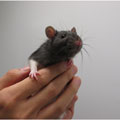Archived Content
The National Institute of Mental Health archives materials that are over 4 years old and no longer being updated. The content on this page is provided for historical reference purposes only and may not reflect current knowledge or information.
How “Quickly Forgotten” Early Life Experiences Mature the Brain
Critical period for learning how to remember events ID’d in rat experiments
• Science Update

Cristina
Alberini,
Ph.D., NYU
Ever wonder why we can’t remember much from our first few years of life? It turns out that those early experiences leave lasting memory traces in our brain, but its memory circuitry hasn’t yet learned how to properly process and store them, suggest experiments in rats by NIMH grantee Christina Alberini, Ph.D. at New York University (NYU). The circuitry’s keen sensitivity to experience during this critical period enables such long-term memory ability to develop through practice.
Reference
Travaglia A, Bisaz R, Sweet ES, Blitzer RD, Alberini CM. Infantile amnesia reflects a developmental critical period for hippocampal learning. Nat Neurosci. 2016 Jul 18. doi: 10.1038/nn.4348. [Epub ahead of print] PMID:27428652
